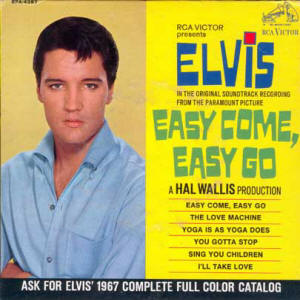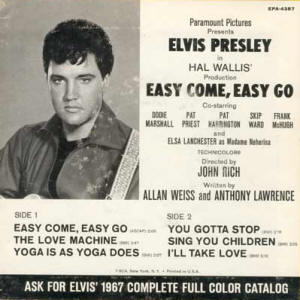Verdict
The vast scoring stage caused a tinny and echoy sound and Elvis' voice was once again brought too much to the fore. The songs themselves are no better or worse than many other movie tunes of this period.
![]()
(C) RCA Victor
The ultimate site about the king of the analogue age


Two days after "Easy Come, Easy Go" hit the cinemas, RCA Victor released the accordant soundtrack ep. The record was shipped on March 24, 1967 and didn't make it on any chart in the US. In Great Britain the label issued a single with "The Love Machine" and "You Gotta Stop", which made it in the top 40. The extended player with the remaining four tracks even became a number one hit. However, worldwide RCA Victor didn't manage to sell more than 30,000 units, which would be 4.5 million paid streams of the complete record. Even in the days of abysmal sales this was a punch to the stomach. No wonder the extended player was removed from the catalogue after a single year.
The ep is not available on the streaming platforms, but the songs can be found on the CAMDEN albums "C'mon Everybody" and "I Got Lucky" (both released in 1971). In 2016 the complete Presley catalogue was restored and remastered by Vic Anesini for a boxed set of 60 compact discs called "The Album Collection". Sony Music Entertainment provides the streaming platforms with the same versions of the individual albums (in some cases with bonus tracks), albeit in 24 bit/90 khz flac. That means, if the platform of your choice supports high resolution audio, you can enjoy the tracks in the same quality Sony used to scan and master them.
Even though Elvis looked quite good in "Easy Come, Easy Go" his manager preferred to use photos made in connection with the MGM movies "Girl Happy" (1965) and "Spinout" (1966).
Elvis recorded the songs between September 28th and 30th, 1966 at the Paramound Scoring Stage in Hollywood/California. The session was produced by Joseph Lilley and engineered by James Wright. The band consisted of Scotty Moore (guitar), Hilmer J. Timbrell (guitar), Charlie McCoy (guitar, organ, harmonica), Michael Rubini (piano), Bob Moore (bass), DJ Fontana (drums), Murrey Harman (drums), Hal Blaine (drums), Curry Tjader (drums), Larry Bunker (drums, on September 29th only), Emil Radoccia (percussion, September 28th only), Mike Henderson (trumpet), Anthony Terran (trumpet, September 28th only), Wyman Parker (trombone), Meredith Flory (saxophone, September 29th only), William Hood (saxophone, September 29th only) and Jerry Scheff (saxophone). The harmony vocals were provided by The Jordanaires (Gordon Stoker, Hoyt Hawkings, Neal Matthews and Ray Walker). It's unknown why so many drummers were booked for the sessions.
In 2007 Follow That Dream Records released a special edition of "Easy Come, Easy Go", which also features several outtakes. For the review tap HERE.
Easy Come, Easy Go
The title song was written by Ben Weisman and Sid Wayne and was recorded by Elvis on September 28, 1966 within nine takes. The singer claims to have a girl in every port, everything is easy and uncomplicated. It's a nice, uptempo movie tune. In 1971 it was also released on CAMDEN's "C' mon Everybody" album.
The Love MachineIn the movie Ted (Elvis) visits the club of his buddy Judd (Pat Harrington jr), where a weel of fortune can be found. The prizes are dates with girls. Of course this invention has to be honored with a song, which was written by Gerald Nelson, Fred Burch and Chuck Taylor. Regarding the music and the performance it's an above average movie song, but the lyrics are somewhat strange. Obviously the girls have no problem dating each and every guy who wins them for an evening. WTF?!? However, Elvis recorded this male fantasy on September 29, 1966 and needed 12 takes to reach a satisfactory result. CAMDEN re-released the song in 1971 on "I Got Lucky".
Yoga Is As Yoga DoesThis spoof of the current fad was also recorded on September 29th within 12 takes and once again the writers are Gerald Nelson and Fred Burch. "Yoga Is As Yoga Does" can be found on the budget album "I Got Lucky", too. The melody is reminiscent of a children's song and the verses make fun of several yoga positions. It's ok for the accordant movie scene (here the song was performed as a duet with Madame Neherina, played by Elsa Lanchester), in general the king recorded a lot of worse songs.
You Gotta StopBecause Elvis wasn't too pleased with the song by Bill Giant, Bernie Baum and Florence Kaye, he had Red West making some adjustments. However, he was given no credit for his work. The reason is unknown, but I guess it was a financial issue. The rhythm track was recorded on September 29th, Elvis added his vocals on the following day. "You Gotta Stop" was also released on "I Got Lucky" (1971).
Sing You ChildrenThis faux gospel by Gerald Nelson and Fred Burch is about Jona and Moses and was originally called "Sing You Sinners". In the end Paramount thought it wasn't really appropriate to have Elvis preaching to sinners in a lightweight musical comedy and so the tune was renamed to "Sing You Children". The melody has a touch of gospel and in general it's a good song. CAMDEN released it in 1971 on the budget album "You'll Never Walk Alone". On September 28th Elvis invested a lot of time in "Sing You Children" and recorded 22 takes.
I'll Take LoveThe nice, uptempo popsong was written by Dolores Fuller and Mark Barkan. Because Elvis couldn't reach a satisfactory take on September 28th, the master was spliced of takes number 4, 8 and 3. In 1971 "I'll Take Love" was re-released on the album "C'mon Everybody".
The vast scoring stage caused a tinny and echoy sound and Elvis' voice was once again brought too much to the fore. The songs themselves are no better or worse than many other movie tunes of this period.
![]()
(C) RCA Victor